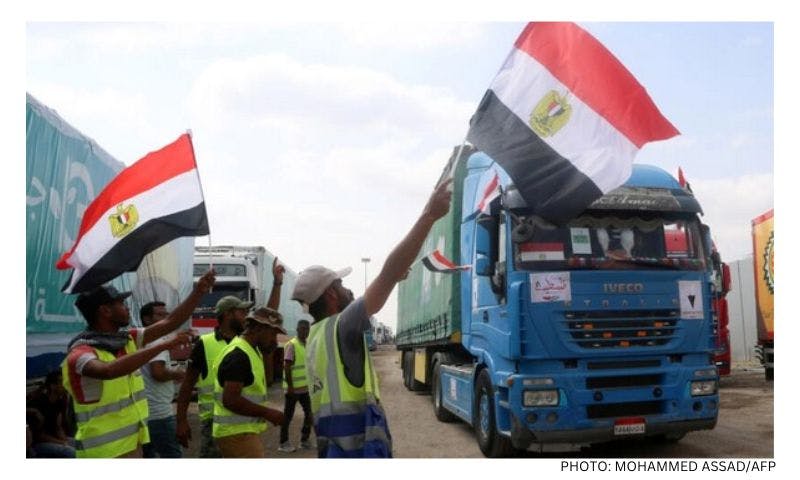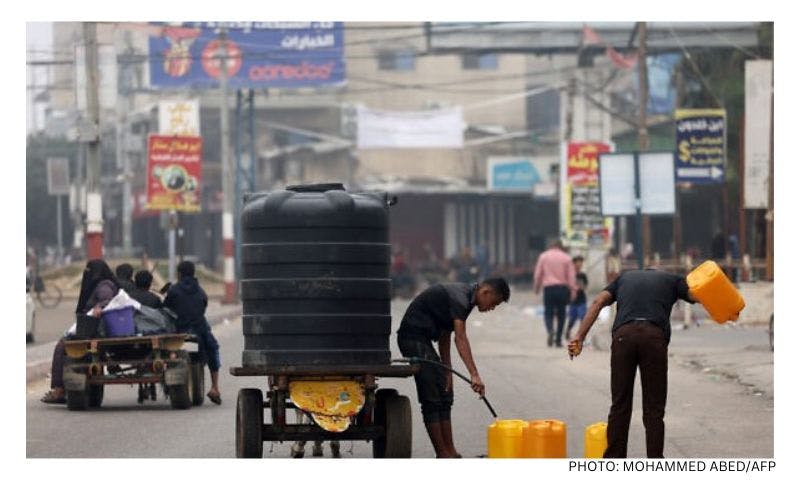Published: 15 February 2021
Last updated: 4 March 2024
THE PLAN FOR MIDDLE EAST climate co-operation reads as if taken from the 1990s, when ambitious plans for Arab-Israeli economic partnerships were floated on the expectation of an Israeli-Palestinian peace.
But even though final status peace negotiations aren’t even on the agenda of the new Biden administration, some believe that it’s a vision whose time may have nonetheless arrived.
A plan dubbed the “Middle East Green Blue Deal” and initiated by the prominent environmental peace NGO, EcoPeace Middle East, features a three-way exchange of green resources across Jordan, Israel and the occupied Palestinian territories that would take billions of dollars in private investment and political goodwill to realise.
The vision involves the construction of large swathes of solar panel farms in the Jordanian desert generating electricity flows westwards to supply the Israeli and Palestinian grids with renewable energy; and, in return, desalinated water from the Mediterranean Sea routed north to the Sea of Galilee and then east to slake Jordan’s parched economy.
The Green Blue Deal includes a second far-reaching plan: to revive the biblical Jordan River as a natural water carrier. Today, the natural border of Israel, Jordan and the West Bank is a small, polluted stream from which most of its flow has been sapped by irrigation canals.
Routing more water into the river would help boost biodiversity and lift the impoverished Jordan rift valley region with revitalised agriculture and billions of dollars from an expansion in tourism.
A third plank of the plan involves working toward a Israeli-Palestinian agreement on sharing water resources in the near term - something that was supposed to be part of a final status agreement. A fourth plank calls for regional educational projects on environmental sustainability and peace.
Despite the relative lack of cross-border cooperation between Israel, Jordan and the Palestinians, EcoPeace leaders argue that their Green Blue Deal plans shouldn’t wait because they are necessary to combat climate change - which threatens to drive already hot temperatures up, drain already scarce water resources and trigger more cross border migration and instability.
All of these ‘green deals’ recognise that climate change is a threat multiplier. We could see it as a threat, or we can see it as an opportunity to change the way we do business... To mitigate and adapt to the implications of climate change - GIDON BROMBERG
Their challenge will be to convince regional leaders that it’s in their national interests to work together on the plan.
“The bottom line is that all of these ‘green deals’ recognise that climate change is a threat multiplier. It has serious implications on environment, development, on the economy and security,’’ said Gidon Bromberg, the co-director of EcoPeace Middle East. “We could see it as a threat, or we can see it as an opportunity to change the way we do business... To mitigate and adapt to the implications of climate change.”
EcoPeace’s plan took its inspiration from so-called “green deal” climate change plans in the US and Europe over the last two years. With the new Biden administration rejoining the Paris climate accord, instituting a slew of executive actions and setting ambitious new goals such as 100 percent clean electricity in 15 years, EcoPeace’s plan may now get added consideration from policymakers. In addition, the Biden administration wants to fund trilateral co-operation.
“There is a lot of money set aside for Palestinian Israel Jordanian projects,” said Daoud Kuttab, an Amman-based Palestinian journalist and political analyst.
At the same time, climate change is no longer the province of environmental policy activists. As its impact becomes apparent in countries from the Arctic to the Middle East, North Africa, and the Asian subcontinent, climate change has increasingly become a focus for national security policy experts.
At a climate change conference in December hosted by Israel’s Institute for National Security Studies, Shira Efron, a senior researcher at the institute, said global warming would impact security at the global, regional, national and individual levels.
Efron told The Jewish Independent that a steady rise in temperatures and sea levels, increased water and food insecurity in Israel and throughout the region, and increased frequency of extreme weather could all undermine regional stability.
[gallery columns="1" size="large" ids="41101"]
“Different models expect millions of climate refugees in the region, some can arrive at Israel’s doorstep,’’ said Efron, who is also an adviser at the RAND Corporation, a non-profit US think tank. “Extreme heat and sea level rise would hurt infrastructure and economic activity and exacerbate socio-economic gaps.”
The most ambitious element of the Green Blue Deal blueprint is an arrangement whereby Jordan would generate solar energy for Israel and the Palestinians, and get desalinated water in return, in what EcoPeace calls a “water energy nexus.”
Jordan would use its vast open desert areas, with cheap land values, for the solar farms in order to generate as much as 4000 megawatts of power that it could export to Israel and the Palestinians using a dedicated power line.
That would help Israel meet its commitment under the Paris climate accord to transition to 30 percent renewable power generation by 2030 - and get the energy at discount from what it pays now. It would also require a precedent-setting decision by Israel to become dependent on power generated in Jordan.
The plan would turn Jordan into an energy exporter while solving chronic water shortages, such as a scarcity of drinking water in Amman. Jordan, which already gets water from Israel’s Sea of Galilee under the peace treaty, would trade the power for desalinated water from plants in Israel and the Gaza Strip.
Climate change is no longer the province of environmental policy activists. As its impact becomes apparent, it has increasingly become a focus for national security policy experts.
The vision of the plan is to boost stability by creating an interdependency between Israel and Jordan - it draws inspiration from a coal and steel exchange in post-war continental Europe that laid the groundwork for the creation of the European Union.
“It’s empowering the Jordanian side to become a regional hub and selling regional energy with Israel,’’ said Yana Abu Taleb, EcoPeace’s Jordanian co-director. “We do not want to be completely dependent on Israel and we need to create healthy interdependencies to help foster peace.”
Abu Taleb said there are several Jordanian and Emirati investors interested in building solar fields in Jordan – a business seen as economically feasible and profitable. At the same time, she acknowledged that creating a water-energy interdependence “is difficult in terms of the political will that’s in place now but EcoPeace is working on building that political will on all sides through the business sector.”
Nonetheless, the Jordanian co-director said EcoPeace is offering “real solutions” to “real problems”.
Kuttab is cautious about the politics. “This reminds me a little of the New Middle East that Shimon Peres wrote about,’’ he told The Jewish Independent. “Politics is a huge stumbling block. Speeding ahead of politics rarely works. If this is in parallel to political developments, it will work. If it runs faster than the politics, it will be on shaky ground.
One former US diplomat said the plan is hard to envision. “It might work in a regular market... but this isn’t a regular market, it has political distortions.”
Speeding ahead of politics rarely works. If this is in parallel to political developments, it will work. If it runs faster than the politics, it will be on shaky ground - DAOUD KUTTAB
Climate change is projected to raise annual temperatures in the region by up to four degrees Celsius by the end of the century, resulting in more summer heat waves. Rainfall is expected to decline across the region by up to 30 percent, and 60 percent in Jordan - but extreme events like flash floods will increase. The lower rainfall will hurt regional agriculture, while heat waves will boost demand for water.
A deal on water sharing is considered an issue that’s supposed to be reached in final status talks, but EcoPeace identifies this as “low hanging fruit”: an issue on which that both sides can reach agreement in the short term and perhaps build confidence for a broader peace deal later on. The Biden administration has said it wants to promote measures that will keep the possibility of a two-state solution a realistic option.
The Palestinians have resisted, in principle, piecemeal approaches to negotiations, pointing to interim peace deals on autonomy reached in the 1990s which failed to mature into a full peace deal.
“We have been faced with a lot of objections and criticism by several technical experts, and hydrologists, and also our leadership and politicians.,’’ said Nada Majdalani, the Palestinian co-director of EcoPeace, which has been promoting the approach on water talks for 12 years.
Now, some Palestinians are recognising that, with the US not prioritising a final status deal now, seeking a partnership on water would develop a pragmatic confidence-building measure.
“It’s a progressive and practical approach which could bring the parties back to the table. progressive and practical approach which could bring the parties back together,” Majdalani said. We’ve reached a point where we are starting to see a shift in the mindset because of the reality.”
That requires a shift from the traditional negotiating approach of “all or nothing”. A water deal would require a redivision of water resources from the natural aquifer under the mountains of the West Bank that was part of the 1994 Oslo Accords.
[gallery columns="1" size="large" ids="41102"]
It would also account for Israel’s newly built desalination capability. Just as critical, it would seek to address the lack of water in the Gaza Strip and the West Bank, as well as Gaza’s sewage problems.
At a December conference sponsored by EcoPeace, Dan Shapiro, the former Israel ambassador to Israel, said principles within the plan could be applied to the Biden administration’s goal of preserving the viability of a two-state solution.
“It might not be realistic to strike a peace deal, but we can strike agreement on concrete national deals in the interest of both sides. When the water and sanitation crisis in Gaza threatens Gaza as a liveable place it impacts not only Gaza, it affects Israel and Egypt as well,’’ Bromberg said. “That’s why a response is needed, not only at the national level, but at the regional level.”
The region has already experienced harmful fallout from global warming. Drought from climate change has been blamed by a 2015 study and climate activists for the social upheaval in Syria that led to the civil war there.
Years of drought in rural areas forced migration into cities that stressed urban populations in Syrian cities, providing the tinder that exploded into a rebellion in 2011. Further stress on vulnerable areas in the region like the Gaza Strip and Lebanon could lead to new geopolitical conflict and migration.
“The bottom line [of the Green Blue Deal] is that no one does each other a favour. These are all critical to the national security of all of us. Climate change doesn’t stop at the border. That is the bigger picture impetus for us. That’s why this must move forward.”




